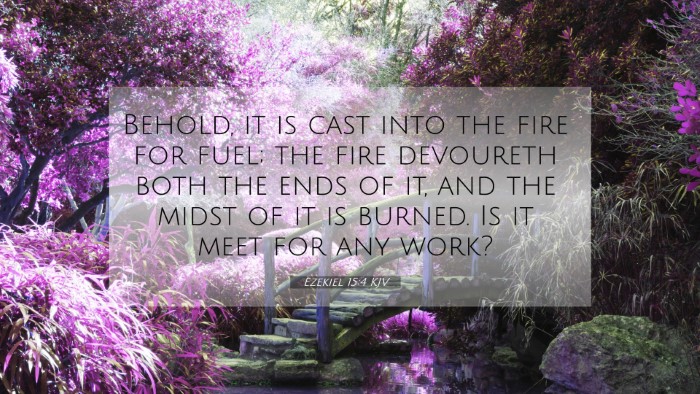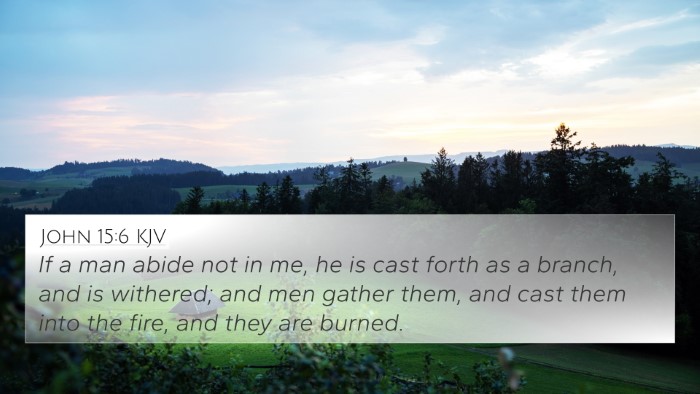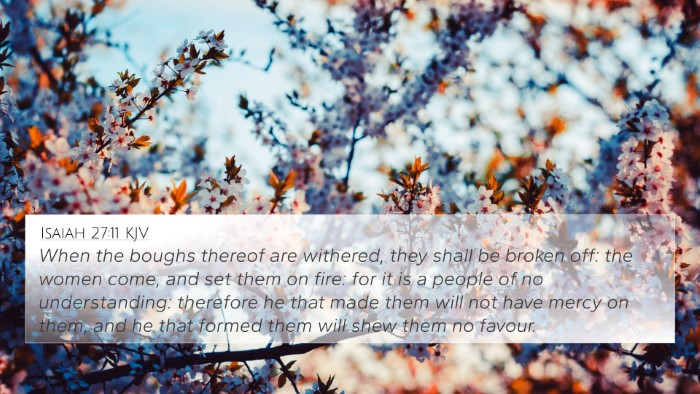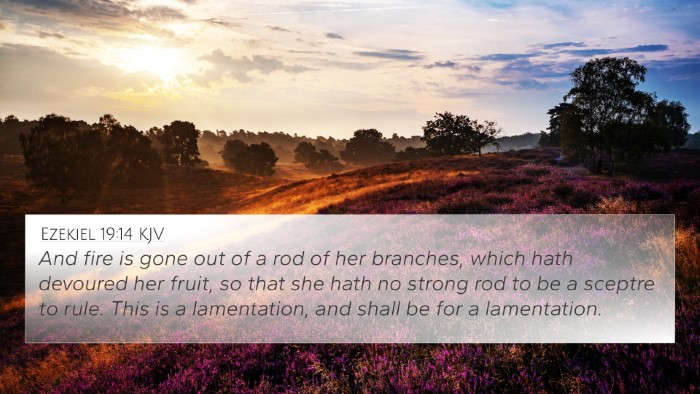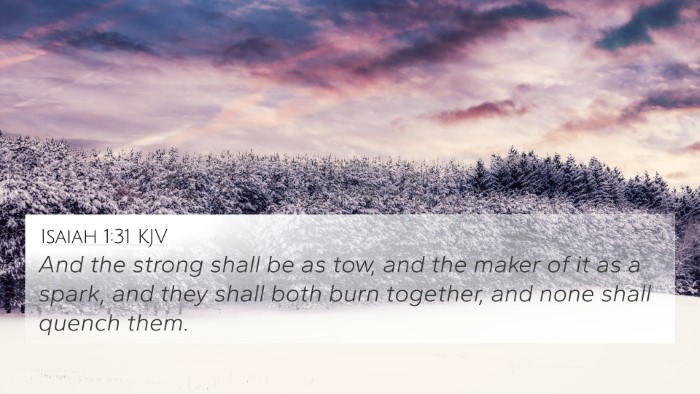Ezekiel 15:4 Meaning and Interpretation
Ezekiel 15:4 states: "Behold, it is cast into the fire for fuel; the fire devoureth both the ends of it, and the midst of it is burned. Is it meat for any work?" This verse serves as a vivid representation of the worthlessness of the vine that has become unusable. Understanding this scripture requires delving into its context, themes, and cross-references in the Bible.
Contextual Overview
This verse is part of Ezekiel's prophecy against Jerusalem, where God uses the imagery of a vine to illustrate the people of Israel. The vine, which was supposed to bear good fruit, has failed in its purpose and thus faces destruction. This reflects God’s judgment, emphasizing the consequences of spiritual unfruitfulness.
Thematic Insights
- Judgment and Worthlessness: The vine represents Israel, which has not fulfilled its divine purpose. The analogy illustrates how, when failing to produce fruit, it is cast into the fire—symbolizing judgment.
- Divine Purpose: Just as a vine is intended to produce grapes, God's people are meant to display His glory. Their failure to do so results in a removal of their protective status.
- Fire as a Purifying Force: The fire consuming the vine symbolizes purification and the inevitability of divine judgment, encouraging reflection on the importance of spiritual fruitfulness in the life of believers.
Bible Verse Cross-References
- Isaiah 5:1-7: This passage uses the vineyard metaphor to depict God’s displeasure with Israel’s unfaithfulness.
- John 15:1-2: Jesus refers to Himself as the true vine, indicating the importance of abiding in Him to bear fruit, contrasting the failed vine of Ezekiel.
- Matthew 3:10: This verse discusses trees that do not produce good fruit being cut down, aligning with the theme of unfruitfulness leading to judgment.
- Jeremiah 2:21: God expresses disappointment over Israel being a degenerate plant, reinforcing the message of spiritual failure.
- Romans 11:17-22: The imagery of branches being broken off connects to the theme of divine judgment and the need for spiritual vitality.
- 1 Corinthians 3:12-15: This passage talks about the testing of works, reflecting the idea that unworthy things will be consumed in judgment.
- Hebrews 6:7-8: Here, the author mentions land that produces thorns and briars, further illustrating the consequences of failing to yield good fruit.
- Revelation 6:14-17: This passage unveils the ultimate judgment and the worthlessness of those who stand against God.
- Psalms 80:8-16: The psalmist's lament about Israel as a vine that He brought out of Egypt underscores the expectation for fruitfulness.
- Luke 13:6-9: The parable of the barren fig tree emphasizes God’s patience, yet highlights the urgency for producing fruits of repentance.
Insights from Commentaries
Matthew Henry's Commentary emphasizes the importance of spiritual vitality, noting that a vine that does not produce fruit is ultimately useless and deserves to be discarded. His insights remind us that God’s purpose in our lives is to be fruitful, and failure leads to divine judgment.
Albert Barnes' Notes on the Bible discusses how God likens His people to a vine that has become worthless. He points out that the fire represents judgment and serves as a warning to believers about the need for spiritual integrity and productivity in their faith.
Adam Clarke's Commentary further elaborates on the significance of divine judgment illustrated in this verse. He remarks that the destruction mentioned signifies the ultimate fate of those who fail to adhere to God’s commands and live fruitlessly. Clarke encourages readers to understand the significance of their actions in the light of God's expectations.
Application and Reflection
This verse calls for deep introspection regarding one's spiritual life. Are we being fruitful, or do we risk being like the vine that is burned for its unproductiveness? It's essential to engage with scripture deeply and connect with other verses that speak to the themes of fruitfulness, judgment, and God's expectations on our lives. Exploring the linked Bible phrases can enrich one’s understanding of God's message and our responsibilities as His people.
Conclusion
Ezekiel 15:4 serves as a poignant reminder of the critical importance of being spiritually fruitful. As believers, we are called to connect with God and produce the fruits that glorify Him. Through the various cross-references and insights from esteemed commentaries, we can better appreciate the profound warnings and lessons contained within this scripture. Engage in a comprehensive Bible cross-reference study to explore these themes further and improve your understanding of the interconnectedness of God's Word.
Further Study Tools
- Bible Concordance: A valuable resource for identifying terms and finding related scripture references.
- Bible Cross-Reference Guide: Useful in tracing themes and verses throughout the Bible.
- Cross-Reference Bible Study: Methods to systematically study the connections between different scriptures.
- Bible Reference Resources: Comprehensive guides can help in locating cross-references quickly.
By utilizing these tools and focusing on the connections between Bible verses, believers can gain richer insights into the word of God and enhance their spiritual journey.


